Pinterest is an undeniably powerful opportunity to reach and convert new audiences.
If you don’t believe me, consider this: The platform has over 250 million users. And roughly 90% of those Pinterest users say they look at content on the network to make purchasing decisions.
However, excelling on Pinterest versus using Pinterest as a strong distribution channel are two different things.
If you’re starting to see an uptick in followers on your Pinterest account, you might want to consider how you can turn those followers into real leads and customers for your business.
Here, let’s explore some creative strategies for turning the followers you get on Pinterest into traffic for your website and social channels.
1. Create boards using relevant keywords.
A board — or an organized compilation of related pins, for easier discoverability — is a necessary component for a good user experience on Pinterest.
For instance, CoSchedule, which has almost 17,000 followers on Pinterest, has organized their pins into boards titled “Content Marketing”, “Social Media Marketing”, “Marketing Inspiration”, and more:
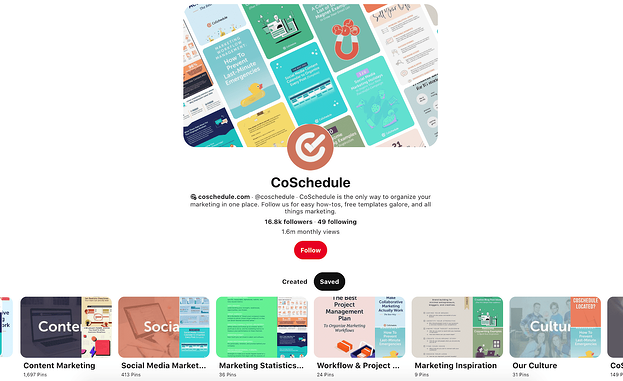
New followers can easily find the pins they’re looking for using these broader categories, which is why it makes sense to use popular keywords when creating your boards, as CoSchedule did.
Additionally, these keyword-optimized boards can help make your Pinterest content more discoverable on search engines when someone searches for related keywords — particularly on Google Image searches, since Pinterest is primarily a visual channel:
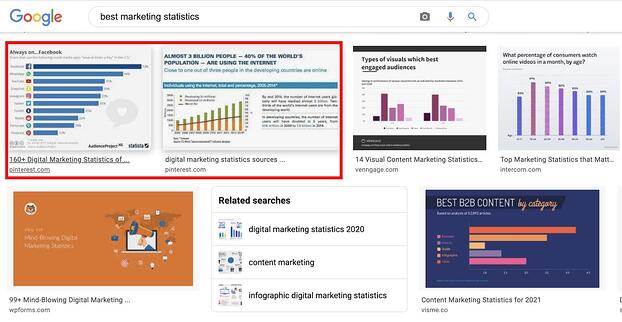
As shown above, two images from Pinterest arise on Google’s Images search page for the search term, “Best marketing statistics”. By creating boards with searchable keywords, you’re more likely to reach users both on, and off, Pinterest.
2. Leverage Rich pins to ensure your Pinterest content is up-to-date.
Simply put, Rich pins can sync with your website to ensure your content is up-to-date on Pinterest when you make any changes to those pages on your site.
There are a few reasons you might use Rich pins. If you post your products on Pinterest, Product Rich Pins can ensure availability and pricing are updated automatically as those factors change on your ecommerce site.
If you post recipes, alternatively, then Recipe Rich pins can add extra information to the recipes you pin to your site — including serving size, diet preference, and ratings — for increased discoverability.
Finally, Article Rich Pins will add headlines, titles, description, and author byline information of the article or blog post to your Pinterest site when you pin an article.
These small details go a long way towards ensuring your Pinterest content is always fresh as users find it. Particularly if you’re aiming to drive sales for products from Pinterest, it’s important to use Product Rich Pins so people aren’t frustrated when they find pricing or other information is different between Pinterest and your product pages.
3. Pin consistently, and often.
You can’t expect much traffic from Pinterest if you don’t regularly pin content on the platform. Pinterest, like any social network, requires dedicated, long-term work to see results.
You wouldn’t expect to write one blog post for your website and see a major, steady flow of traffic as a result — and the same goes for Pinterest.
Additionally, as your followers grow, you want to provide high-quality, interesting content to increase brand loyalty and keep those followers active on your page. By regularly pinning, you’re increasing your odds of converting those followers into fans of your brand — which will ultimately drive them off Pinterest, and onto your website or social pages.
4. Optimize your pins — and boards — for search.
At its core, Pinterest is essentially its own visual search engine. And, similar to other search engines, keyword-optimized content performs best on the network.
Additionally, keyword optimizing your Pinterest profile increases your chances to rank organically on other search engines, and drive traffic from search engines like Google to your Pinterest site.
To optimize your Pinterest page, consider inserting brand-related keywords into your bio and profile, pin descriptions, board titles, board descriptions, and even the image alt-text of content you post on Pinterest.
This can help your images appear on Google’s Image search results, as well as improve your chances of ranking on Pinterest for your intended keywords.
5. Create pin-worthy images, and use those images to link out to original content on your website or social pages.
One of the easiest ways to drive traffic back to your website is by creating unique, original content specifically for Pinterest, and then using that pin to link back to your website or blog post.
For instance, consider the infographic below, which I found when searching “best social media platforms” on Pinterest:
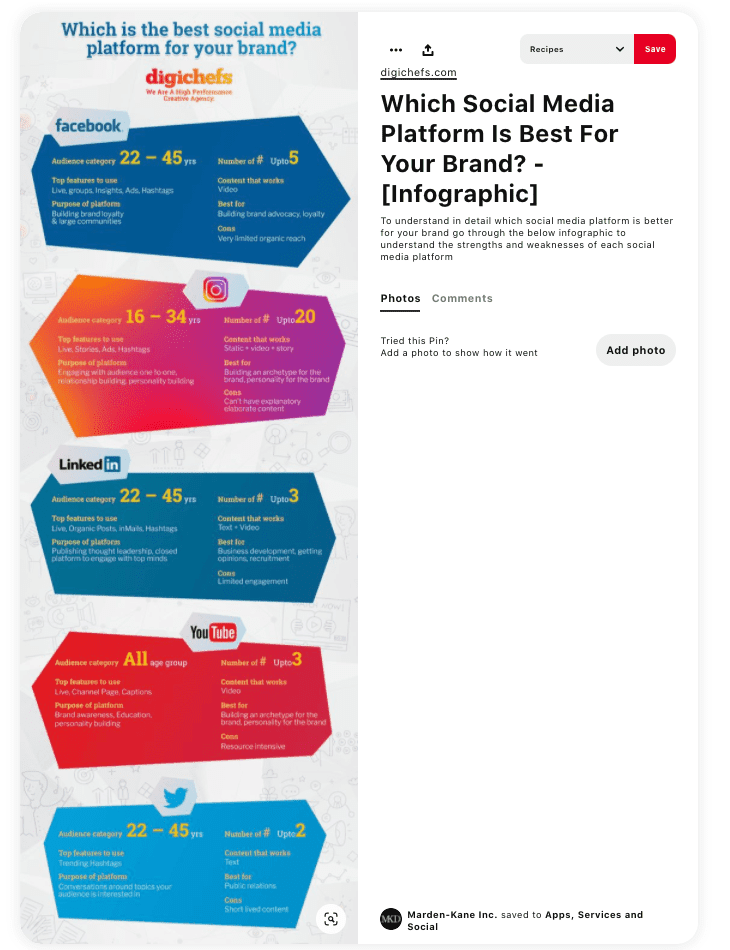
It’s a good idea to create unique, standalone value with your images for Pinterest. In this case, I can find my answer to “best social media platforms” by looking at the infographic itself without ever leaving Pinterest — which makes for a better user experience.
However, if I’ve found unique value in the content, I might want to click the brand’s website to learn more about their business or see additional content. When I click on the digichef URL, I’m taken to the original page for the infographic, on the business’ website:
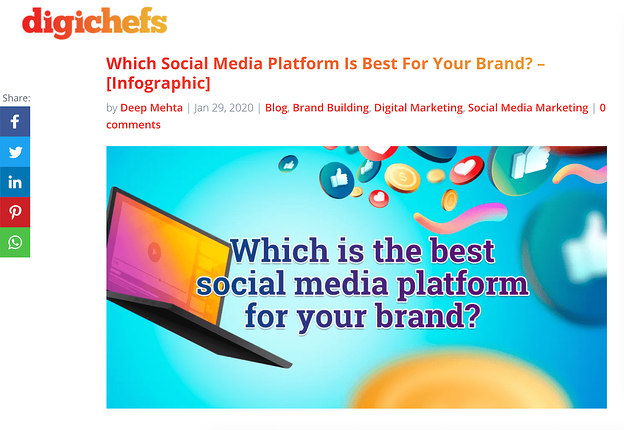
You might try a similar approach with your own Pinterest strategy. Consider how you can create unique, standalone content that will perform well on Pinterest. Alternatively, perhaps you can post infographics or other visual assets you’ve already created for your brand on Pinterest, with a link back to your site.
6. Follow similar brands for content inspiration, as well as opportunities to re-pin images that align with your brand.
With Pinterest, each pin you save doesn’t have to be original branded content. Instead, one easy opportunity to increase engagement is to re-pin images that align with your brand to share with your own followers.
Additionally, following other brands can increase traffic to your own Pinterest profile and, ultimately, your website. When you follow someone on Pinterest, Pinterest sends a notification letting them know they have a new follower. Some of those people may then follow you back in return, which is a good way to grow your audience.
Following similar brands can also help you identify popular or trending content on other profiles, as well as gaps in your own Pinterest content strategy.
If you work at a home decor ecommerce store, for instance, you might find that many competitors are posting ‘Easter Home Decor’ images:
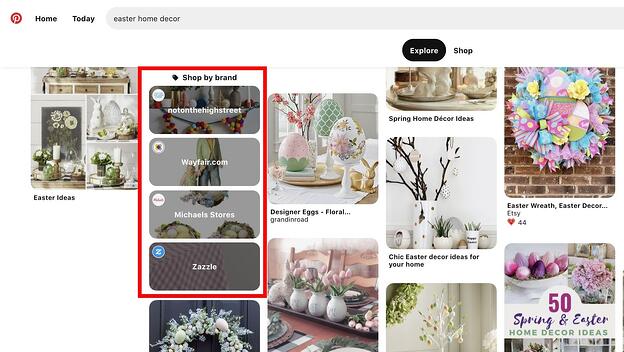
This might inspire your team to create your own version of Easter home decor content, as well as other seasonal pins and boards.
Finally, consider partnering with certain brands that have complementary products or services to your own. For example, Benefit Cosmetics partnered with Shutterfly to create the page, “Wedding Looks: benefit cosmetics x Wedding Paper Divas“:
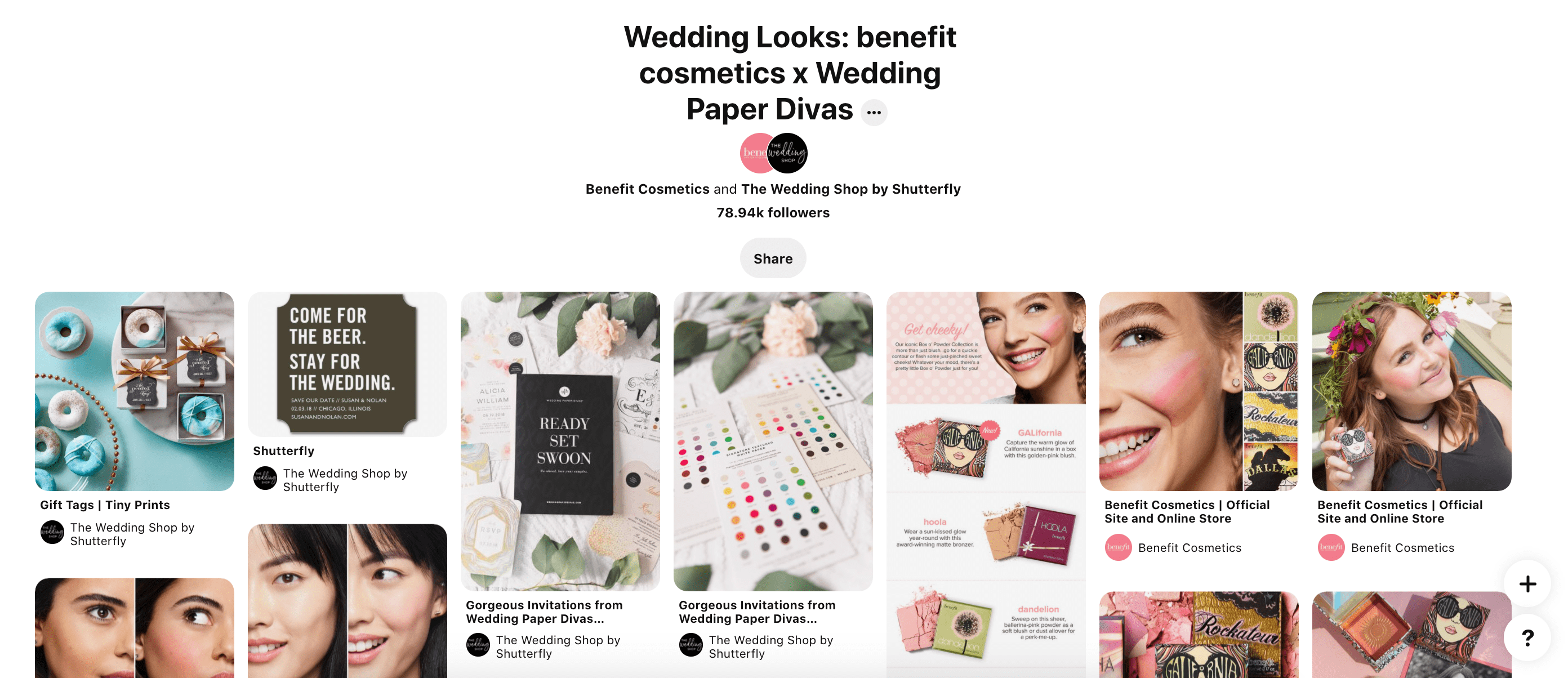
The page is filled with pins related to both makeup and stationary for the big day. For expanding your reach and increasing value for your followers, you might try partnering with other popular brands on Pinterest.
Ultimately, creating a successful Pinterest strategy takes work and dedication, but if you find Pinterest is a popular social platform with your target audience, it’s likely worth the time and effort it takes to grow your following, increase brand awareness, and ultimately drive sales.
![]()


